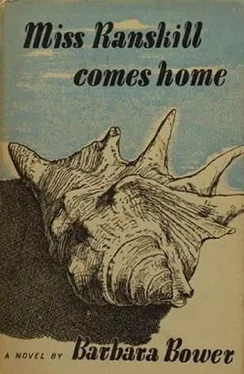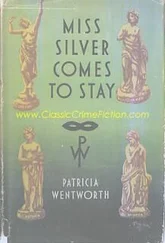‘To stay? My dear Nona! Whatever for? Besides, where would he sleep? What would Philippa say? Think of the rations and a great boy eating his head off and bringing in mud and banging about all over the place. Besides–’
Miss Ranskill interrupted before the spate of objections confused her.
‘He could sleep in the summer-house in the hammock: it’s lovely weather. And he would bring his ration book: it couldn’t cost much. It isn’t muddy weather. He wouldn’t bang about. If Mrs Phillips objected I might be able to borrow a tent and let him camp in one of the fields. I could camp with him for that matter.’
There followed a silence so long and so ominous that she broke it tremulously, ‘I don’t see why not!’
‘If you knew these children as I do,’ Edith put down the half-finished seaman’s sock, ‘you would know that the idea is absolutely impossible. The village is only just clear of evacuees. I know, if you don’t , that it is perfectly senseless to try to take these children out of their proper places.’
A line from Blake frisked through Miss Ranskill’s mind – ‘White as an angel is the English child.’ But only the child of the upper middle classes, not the little gutter boy, whose kind had disturbed but not, alas, shattered the complacency of householders when they had stormed the English castles. Not the Carpenter’s son either, not even the son of the Carpenter of Bethlehem.
‘From what you’ve told me,’ pursued Edith, ‘this boy had a perfectly good home, even if you didn’t like the mother particularly.’
‘He’s not happy.’
‘Did he say so?’
‘Children don’t say, Edith: they don’t even know . But we know, or ought to, that peevishness is bad for them–’
‘A good dose of medicine is the best thing for that .’
‘Oh!’ Miss Ranskill’s voice rose irritably. ‘If only you wouldn’t be so reasonable always! I was talking about the mother’s peevishness, not the boy’s: he is too patient, and it’s all wrong.’
‘So,’ said Edith, ‘you want to ask him to stay here so that you can tell him how unhappy he is at home and how peevish his mother is. You want to spoil him for a week-end and then send him back to be dissatisfied with his own home; very mistaken sort of kindness, I should think.’
‘I want to talk to him about his father, and–’
‘Surely his mother is the person to do that. I don’t want to damp your enthusiasm , Nona. You ought to know that nobody would be readier to help than I if it were a case of real necessity , if he needed warm woollens or anything of that sort, but you always have had such wild ideas.’
‘I suppose so.’ Miss Ranskill answered conversationally, but her mind was groping for an answer that could be made in words that would not shock.
She knew now how much she had loved the Carpenter, though not in the way that is usually described as ‘being in love’. Slowly and steadily affection had grown between them, with such firmness that she, who had never known wifehood had yet felt herself widowed by his death. Her celibacy had been no bar to the true marriage of their minds; and the attunement between them had been absolute; so that they had become unwitting partners in the third, but not least blessed, state for which matrimony was also ordained – The mutual society, help and comfort, that the one ought to have of the other, both in prosperity and adversity.
Prosperity had meant food and the easy blazing of the beacon fire, a well-balanced fish-hook and the co-operation of wind and tide; adversity had been the snapping of a plank, the escape of a fish and squalling gusts that soaked the kindling. The mutual help had not only been expended on easing the daily struggle for existence, it had lent hope to the fight and eased and released the mind.
The moment she had been left alone on the island, she had known herself inheritor, not only of the boat and the jack-knife and the Carpenter’s ragged clothing, but of his purpose also. The purpose was the restoring of a father to a son. She, to a certain extent, could do that restoring because, for four years, she had shared the mind of the father. She had power to raise the dead, and to foster that part of the Carpenter’s immortality that had been bestowed on the boy at the time of his begetting.
Seems to me, Miss Ranskill, you never die properly, not if you’re a father. Soon as you hear the first squall of the baby, you thinks to yourself, I’ve finished with sleep for a bit. Later on when the boy’s running about you thinks, ‘And I’ve done with death too.’ It’s like watching yourself grow young.
She had seen him grow young in the face of Colin and now, if she were allowed, she could add truth to the story held in the sea-shell.
‘I expect you will soon be able to take up some war-work,’ said Edith, dismissing the Carpenter’s son.
‘Yes, soon, I should think.’ Miss Ranskill’s words gave an impatient push to her dreams. ‘I’m fit enough now.’
‘By the way, Miss Hoskins asked me if I thought you’d be well enough to give a talk to the Women’s Institute. I said I’d ask.’
‘But what can I talk about – fish-drying or boat-building, or “How I Wore the Same Clothes for Four Years and Just Kept Decent”?’
‘You could touch on that, perhaps,’ said Edith, ‘not the boat-building though, except lightly . Miss Hoskins suggested “My Life on a Desert Island” would be a good subject. Do try , Nona: it would be good for you and most interesting to them .’
Good for her? To parade the torments and hardships of the past four years on the platform of a village hall? Interesting for them to rub the bloom off the frail remembered happiness with questions?
‘It would be a change from all the cake-making and bottling,’ urged Edith. ‘And it would save all the bother and expense of arranging for a lecturer from a distance and providing transport.’
When we get home, Miss Ranskill, we’ll have some tales to tell that’ll make ’em all sit up.
‘Very well,’ she agreed.
She would make them sit up. She would harden her heart against hurt, as once she had been forced to harden her body, before her hands had learned resistance to blisters, and her feet to withstand the biting of shale. She would tell them things that would make them forget the kitchen sinks and the rationing, the shortage of milk and the shortage of fat. In doing this, she would shake her own mind free of clutter and homesickness; and stop nursing her dreams in the way that demented young women of fiction hug dead babies to their breasts instead of getting supper for the older children.
II
Below the platform and to the left of Miss Ranskill, one of the Institute members was hammering our Parry’s ‘Jerusalem’ on a piano that needed tuning: the others were singing Blake’s miraculous words and showing no hint of zest or humour.
Bring me my bow of burning gold!
Bring me my arrows of desire!
wavered little Miss King, who could not even manage her knitting-needles, and who had said only that morning to Edith Ranskill that an extra two ounces on the fat ration would make all the difference.
‘Bring me my chariot of fire,’ shouted Miss Bridge, whose nervousness on a bicycle was a joy to all the village boys.
Then all of them, including Miss Moffat (a most ardent persecutor of some little Jewish children, members of a Polish-Jew refugee family who lived in the cottage next door), the rather feebleminded Miss Lindsay, and Miss Staples, who would not let her evacuees play with toy soldiers, added:
Читать дальше












